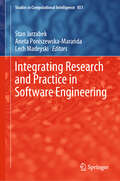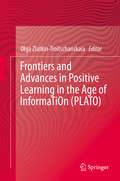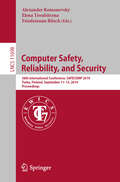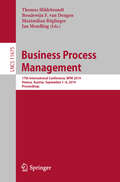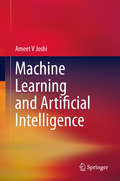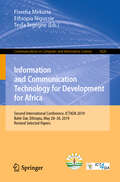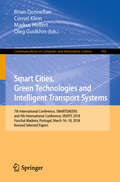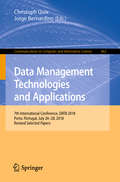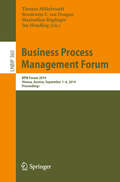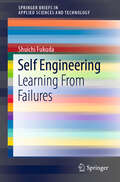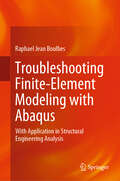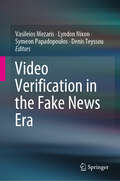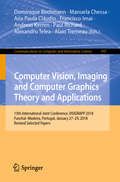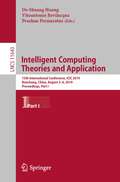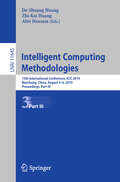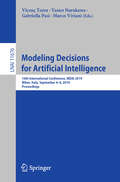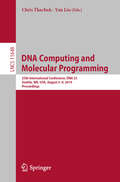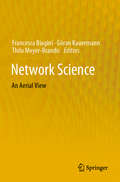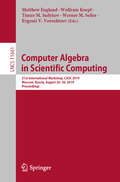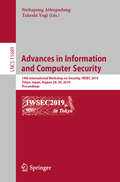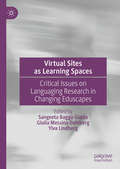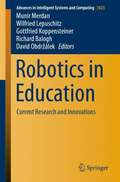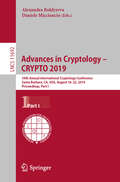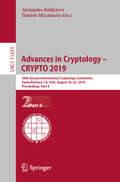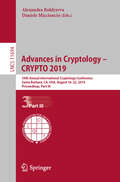- Table View
- List View
Integrating Research and Practice in Software Engineering (Studies in Computational Intelligence #851)
by Stan Jarzabek Aneta Poniszewska-Marańda Lech MadeyskiIn this book, the authors highlight recent findings that hold the potential to improve software products or development processes; in addition, they help readers understand new concepts and technologies, and to see what it takes to migrate from old to new platforms. Some of the authors have spent most of their careers in industry, working at the frontiers of practice-based innovation, and are at the same time prominent researchers who have made significant academic contributions. Others work together with industry to test, in industrial settings, the methods they’ve developed in the lab. The choice of subject and authors represent the key elements of this book. Its respective chapters cover a wide range of topics, from cloud computing to agile development, applications of data science methods, re-engineering of aging applications into modern ones, and business and requirements engineering. Taken together, they offer a valuable asset for practitioners and researchers alike.
Frontiers and Advances in Positive Learning in the Age of InformaTiOn (PLATO)
by Olga Zlatkin-TroitschanskaiaResearch on students’ media use outside of education is just slowly taking off. Influences of information and communication technologies (ICT) on human information processing are widely assumed and particularly effects of dis- and misinformation are a current threat to democracies. Today, higher education competes with a very diverse (online) media landscape and domain-specific content from sources of varying quality, ranging from high-quality videographed lectures by top-level university lecturers, popular-scientific video talks, collaborative wikis, anonymous forum comments or blog posts to YouTube remixes of discipline factoids and unverified twitter feeds. Self-organizing learners need more knowledge, skills, and awareness on how to critically evaluate quality and select trustworthy sources, how to process information, and what cognitive, affective, attitudinal, behavioral, and neurological effects it can have on them in the long term. The PLATO program takes on the ambitious goal of uniting strands of research from various disciplines to address these questions through fundamental analyses of human information processing when learning with the Internet. This innovative interdisciplinary approach includes elements of ICT innovations and risks, learning analytics and large-scale computational modelling aimed to provide us with a better understanding of how to effectively and autonomously acquire reliable knowledge in the Information Age, how to design ICTs, and shape social and human-machine interactions for successful learning. This volume will be of interest to researchers in the fields of educational sciences, educational measurement and applied branches of the involved disciplines, including linguistics, mathematics, media studies, sociology of knowledge, philosophy of mind, business, ethics, and educational technology.
Computer Safety, Reliability, and Security: 38th International Conference, SAFECOMP 2019, Turku, Finland, September 11–13, 2019, Proceedings (Lecture Notes in Computer Science #11698)
by Alexander Romanovsky Elena Troubitsyna Friedemann BitschThis book constitutes the proceedings of the 38th International Conference on Computer Safety, Reliability and Security, SAFECOMP 2019, held in Turku, Finland, in September 2019. The 16 full and 5 short papers included in this volume were carefully reviewed and selected from 65 submissions. They were organized in topical sections named: formal verification; autonomous driving; safety and reliability modeling; security engineering and risk assessment; safety argumentation; verification and validation of autonomous systems; and interactive systems and design validation.
Business Process Management: 17th International Conference, BPM 2019, Vienna, Austria, September 1–6, 2019, Proceedings (Lecture Notes in Computer Science #11675)
by Thomas Hildebrandt Boudewijn F. van Dongen Maximilian Röglinger Jan MendlingThis book constitutes the proceedings of the 17th International Conference on Business Process Management, BPM 2019, held in Vienna, Austria, in September 2019. The 23 full and 4 tutorial short papers included in this volume were carefully reviewed and selected from 115 submissions. The papers were organized in topical sections named: foundations; engineering; and management.
Machine Learning and Artificial Intelligence
by Ameet V JoshiThis book provides comprehensive coverage of combined Artificial Intelligence (AI) and Machine Learning (ML) theory and applications. Rather than looking at the field from only a theoretical or only a practical perspective, this book unifies both perspectives to give holistic understanding. The first part introduces the concepts of AI and ML and their origin and current state. The second and third parts delve into conceptual and theoretic aspects of static and dynamic ML techniques. The forth part describes the practical applications where presented techniques can be applied. The fifth part introduces the user to some of the implementation strategies for solving real life ML problems. The book is appropriate for students in graduate and upper undergraduate courses in addition to researchers and professionals. It makes minimal use of mathematics to make the topics more intuitive and accessible.Presents a full reference to artificial intelligence and machine learning techniques - in theory and application;Provides a guide to AI and ML with minimal use of mathematics to make the topics more intuitive and accessible;Connects all ML and AI techniques to applications and introduces implementations.
Information and Communication Technology for Development for Africa: Second International Conference, ICT4DA 2019, Bahir Dar, Ethiopia, May 28-30, 2019, Revised Selected Papers (Communications in Computer and Information Science #1026)
by Fisseha Mekuria Ethiopia Nigussie Tesfa TegegneThis book constitutes the proceedings of the Second International Conference on Information and Communication Technology for Development for Africa, ICT4DA 2019, held in Bahir Dar, Ethiopia, in May 2019.The 29 revised full papers presented were carefully reviewed and selected from 69 submissions. The papers address the impact of ICT in fostering economic development in Africa. In detail they cover the following topics: artificial intelligence and data science; wireless and mobile computing; and Natural Language Processing.
Smart Cities, Green Technologies and Intelligent Transport Systems: 7th International Conference, SMARTGREENS, and 4th International Conference, VEHITS 2018, Funchal-Madeira, Portugal, March 16-18, 2018, Revised Selected Papers (Communications in Computer and Information Science #992)
by Brian Donnellan Cornel Klein Markus Helfert Oleg GusikhinThis book constitutes the thoroughly refereed post-conference proceedings of the 7th International Conference on Smart Cities and Green ICT Systems, SMARTGREENS 2018, and the 4th International Conference on Vehicle Technology and Intelligent Transport Systems, VEHITS 2018, held in Funchal-Madeira, Portugal in March 2018.The 18 full papers presented during SMARTGREENS 2018 and VEHITS 2018 were carefully reviewed and selected from numerous submissions. The papers reflect topics such as smart cities and green ICT systems; vehicle technology and intelligent transport systems.
Data Management Technologies and Applications: 7th International Conference, DATA 2018, Porto, Portugal, July 26–28, 2018, Revised Selected Papers (Communications in Computer and Information Science #862)
by Christoph Quix Jorge BernardinoThis book constitutes the thoroughly refereed proceedings of the 7th International Conference on Data Management Technologies and Applications, DATA 2018, held in Porto, Portugal, in July 2018. The 9 revised full papers were carefully reviewed and selected from 69 submissions. The papers deal with the following topics: databases, big data, data mining, data management, data security, and other aspects of information systems and technology involving advanced applications of data.
Business Process Management Forum: BPM Forum 2019, Vienna, Austria, September 1–6, 2019, Proceedings (Lecture Notes in Business Information Processing #360)
by Thomas Hildebrandt Boudewijn F. van Dongen Maximilian Röglinger Jan MendlingThis book constitutes the proceedings of the BPM Forum held during the 17th International Conference on Business Process Management, BPM 2019, which took place in Vienna, Austria, in September 2019. The BPM Forum hosts innovative research which has a high potential of stimulating discussions. The papers selected for the forum are expected to showcase fresh ideas from exciting and emerging topics in BPM, even if they are not yet as mature as the regular papers at the conference. The 13 full papers included in this volume were carefully reviewed and selected from a total of 115 submissions. The papers were organized in topical sections named: specification; execution; analytics; and management.
Self Engineering: Learning From Failures (SpringerBriefs in Applied Sciences and Technology)
by Shuichi FukudaThis book demonstrates how the creation of emotional satisfaction will change in tomorrow’s connected, IoT world. The importance of emotional satisfaction will increase in the IoT Connected Society of World 2.0, in which humans and machines work together as members of the same team with no walls between the two, and where production is also team-based. Developing emotional satisfaction in such a diverse team and in a very different environment is a major challenge and needs to be studied from a broad perspective. This book describes the emerging issues and how they can be to tackled, introducing paths for moving beyond static value toward developing dynamic value.
Troubleshooting Finite-Element Modeling with Abaqus: With Application in Structural Engineering Analysis
by Raphael Jean BoulbesThis book gives Abaqus users who make use of finite-element models in academic or practitioner-based research the in-depth program knowledge that allows them to debug a structural analysis model. The book provides many methods and guidelines for different analysis types and modes, that will help readers to solve problems that can arise with Abaqus if a structural model fails to converge to a solution. The use of Abaqus affords a general checklist approach to debugging analysis models, which can also be applied to structural analysis.The author uses step-by-step methods and detailed explanations of special features in order to identify the solutions to a variety of problems with finite-element models. The book promotes: • a diagnostic mode of thinking concerning error messages; • better material definition and the writing of user material subroutines; • work with the Abaqus mesher and best practice in doing so; • the writing of user element subroutines and contact features with convergence issues; and• consideration of hardware and software issues and a Windows HPC cluster solution.The methods and information provided facilitate job diagnostics and help to obtain converged solutions for finite-element models regarding structural component assemblies in static or dynamic analysis. The troubleshooting advice ensures that these solutions are both high-quality and cost-effective according to practical experience. The book offers an in-depth guide for students learning about Abaqus, as each problem and solution are complemented by examples and straightforward explanations. It is also useful for academics and structural engineers wishing to debug Abaqus models on the basis of error and warning messages that arise during finite-element modelling processing.
Video Verification in the Fake News Era
by Vasileios Mezaris Lyndon Nixon Symeon Papadopoulos Denis TeyssouThis book presents the latest technological advances and practical tools for discovering, verifying and visualizing social media video content, and managing related rights. The digital media revolution is bringing breaking news to online video platforms, and news organizations often rely on user-generated recordings of new and developing events shared in social media to illustrate the story. However, in video, there is also deception. In today's "fake news" era, access to increasingly sophisticated editing and content management tools and the ease with which fake information spreads in electronic networks, require the entire news and media industries to carefully verify third-party content before publishing it. As such, this book is of interest to computer scientists and researchers, news and media professionals, as well as policymakers and data-savvy media consumers.
Computer Vision, Imaging and Computer Graphics Theory and Applications: 13th International Joint Conference, VISIGRAPP 2018 Funchal–Madeira, Portugal, January 27–29, 2018, Revised Selected Papers (Communications in Computer and Information Science #997)
by Dominique Bechmann Manuela Chessa Ana Paula Cláudio Francisco Imai Andreas Kerren Paul Richard Alexandru Telea Alain TremeauThis book constitutes thoroughly revised and selected papers from the 13th International Joint Conference on Computer Vision, Imaging and Computer Graphics Theory and Applications, VISIGRAPP 2018, held in Funchal-Madeira, Portugal, in January 2018. The 18 thoroughly revised and extended papers presented in this volume were carefully reviewed and selected from 317 submissions. The papers contribute to the understanding of relevant trends of current research on computer graphics; human computer interaction; information visualization; computer vision.
Intelligent Computing Theories and Application: 15th International Conference, ICIC 2019, Nanchang, China, August 3–6, 2019, Proceedings, Part I (Lecture Notes in Computer Science #11643)
by Prashan Premaratne De-Shuang Huang Vitoantonio BevilacquaThis two-volume set of LNCS 11643 and LNCS 11644 constitutes - in conjunction with the volume LNAI 11645 - the refereed proceedings of the 15th International Conference on Intelligent Computing, ICIC 2019, held in Nanchang, China, in August 2019. The 217 full papers of the three proceedings volumes were carefully reviewed and selected from 609 submissions. The ICIC theme unifies the picture of contemporary intelligent computing techniques as an integral concept that highlights the trends in advanced computational intelligence and bridges theoretical research with applications. The theme for this conference is “Advanced Intelligent Computing Methodologies and Applications.” Papers related to this theme are especially solicited, including theories, methodologies, and applications in science and technology.
Intelligent Computing Methodologies: 15th International Conference, ICIC 2019, Nanchang, China, August 3–6, 2019, Proceedings, Part III (Lecture Notes in Computer Science #11645)
by De-Shuang Huang Zhi-Kai Huang Abir HussainThis two-volume set of LNCS 11643 and LNCS 11644 constitutes - in conjunction with the volume LNAI 11645 - the refereed proceedings of the 15th International Conference on Intelligent Computing, ICIC 2019, held in Nanchang, China, in August 2019. The 217 full papers of the three proceedings volumes were carefully reviewed and selected from 609 submissions.The ICIC theme unifies the picture of contemporary intelligent computing techniques as an integral concept that highlights the trends in advanced computational intelligence and bridges theoretical research with applications. The theme for this conference is “Advanced Intelligent Computing Methodologies and Applications.” Papers related to this theme are especially solicited, including theories, methodologies, and applications in science and technology.
Modeling Decisions for Artificial Intelligence: 16th International Conference, MDAI 2019, Milan, Italy, September 4–6, 2019, Proceedings (Lecture Notes in Computer Science #11676)
by Vicenç Torra Yasuo Narukawa Gabriella Pasi Marco VivianiThis book constitutes the refereed proceedings of the 16th International Conference on Modeling Decisions for Artificial Intelligence, MDAI 2019, held in Milan, Italy, in September 2019. The 30 papers presented in this volume were carefully reviewed and selected from 50 submissions. They discuss different facets of decision processes in a broad sense and present research in data science, data privacy, aggregation functions, human decision making, graphs and social networks, and recommendation and search. The papers are organized in the following topical sections: aggregation operators and decision making; data science and data mining; and data privacy and security.
DNA Computing and Molecular Programming: 25th International Conference, DNA 25, Seattle, WA, USA, August 5–9, 2019, Proceedings (Lecture Notes in Computer Science #11648)
by Chris Thachuk Yan LiuThis book constitutes the refereed proceedings of the 25th International Conference on DNA Computing and Molecular Programming, DNA 25, held in Seattle, WA, USA, in August 2019.The 12 full papers presented were carefully selected from 19 submissions. The papers cover a wide range of topics relating to biomolecular computing such as algorithms and models for computation on biomolecular systems; computational processes in vitro and in vivo; molecular switches, gates, devices, and circuits; molecular folding and self-assembly of nanostructures; analysis and theoretical models of laboratory techniques; molecular motors and molecular robotics; information storage; studies of fault-tolerance and error correction; software tools for analysis, simulation, anddesign; synthetic biology and in vitro evolution; and applications in engineering, physics, chemistry, biology, and medicine.
Network Science: An Aerial View
by Francesca Biagini Göran Kauermann Thilo Meyer-BrandisThis book provides an overview of network science from the perspective of diverse academic fields, offering insights into the various research areas within network science. The authoritative contributions on statistical network analysis, mathematical network science, genetic networks, Bayesian networks, network visualisation, and systemic risk in networks explore the main questions in the respective fields: What has been achieved to date? What are the research challenges and obstacles? What are the possible interconnections with other fields? And how can cross-fertilization between these fields be promoted? Network science comprises numerous scientific disciplines, including computer science, economics, mathematics, statistics, social sciences, bioinformatics, and medicine, among many others. These diverse research areas require and use different data-analytic and numerical methods as well as different theoretical approaches. Nevertheless, they all examine and describe interdependencies, associations, and relationships of entities in different kinds of networks. The book is intended for researchers as well as interested readers working in network science who want to learn more about the field – beyond their own research or work niche. Presenting network science from different perspectives without going into too much technical detail, it allows readers to gain an overview without having to be a specialist in any or all of these disciplines.
Computer Algebra in Scientific Computing: 21st International Workshop, CASC 2019, Moscow, Russia, August 26–30, 2019, Proceedings (Lecture Notes in Computer Science #11661)
by Matthew England Wolfram Koepf Timur M. Sadykov Werner M. Seiler Evgenii V. VorozhtsovThis book constitutes the refereed proceedings of the 21st International Workshop on Computer Algebra in Scientific Computing, CASC 2019, held in Moscow, Russia, in August 2019.The 28 full papers presented together with 2 invited talks were carefully reviewed and selected from 44 submissions. They deal with cutting-edge research in all major disciplines of computer algebra. The papers cover topics such as polynomial algebra, symbolic and symbolic-numerical computation, applications of symbolic computation for investigating and solving ordinary differential equations, applications of CASs in the investigation and solution of celestial mechanics problems, and in mechanics, physics, and robotics.
Advances in Information and Computer Security: 14th International Workshop on Security, IWSEC 2019, Tokyo, Japan, August 28–30, 2019, Proceedings (Lecture Notes in Computer Science #11689)
by Nuttapong Attrapadung Takeshi YagiThis book constitutes the refereed proceedings of the 14th International Workshop on Security, IWSEC 2019, held in Tokyo, Japan, in August 2019. The 18 regular papers and 5 short papers presented in this volume were carefully reviewed and selected from 61 submissions. They were organized in topical sections named: Public-Key Primitives; Cryptanalysis on Public-Key Primitives; Cryptographic Protocols; Symmetric-Key Primitives; Malware Detection and Classification; Intrusion Detection and Prevention; Web and Usable Security; Cryptanalysis on Symmetric-Key Primitives; and Forensics.
Virtual Sites as Learning Spaces: Critical Issues on Languaging Research in Changing Eduscapes
by Sangeeta Bagga-Gupta Giulia Messina Dahlberg Ylva LindbergThis volume fills a gap in the literature between the domains of Communication Studies and Educational Sciences across physical-virtual spaces as they intersect in the 21st century. The chapters focus on “languaging” - communicative practices in the making - and its intersection with analogue and virtual learning spaces, bringing together studies that highlight the constant movement between analogue-virtual dimensions that continuously re-shape participants' identity positionings. Languaging is understood as the deployment of one or more than one language variety, modality, embodiment, etc in human meaning-making across spaces. Languaging activities are explored through a multitude of literary artefacts, genres, media, and modes produced in and across sites. The authors go beyond “best practice” approaches and instead present “how-to-explore” communicative practices for researchers, learners and teachers. This book will be of interest to readers situated in the areas of literacy, literature, bi/multilingualism, multimodality, linguistic anthropology, applied linguistics, and related fields. Chapters 2, 5, 8 and 12 are open access under a CC BY 4.0 license at link.springer.com.
Robotics in Education: Current Research and Innovations (Advances in Intelligent Systems and Computing #1023)
by Munir Merdan Wilfried Lepuschitz Gottfried Koppensteiner Richard Balogh David ObdržálekThis proceedings book gathers the latest achievements and trends in research and development in educational robotics from the 10th International Conference on Robotics in Education (RiE), held in Vienna, Austria, on April 10–12, 2019. It offers valuable methodologies and tools for robotics in education that encourage learning in the fields of science, technology, engineering, arts and mathematics (STEAM) through the design, creation and programming of tangible artifacts for creating personally meaningful objects and addressing real-world societal needs. It also discusses the introduction of technologies ranging from robotics platforms to programming environments and languages and presents extensive evaluations that highlight the impact of robotics on students’ interests and competence development. The approaches included cover the entire educative range, from the elementary school to the university level in both formal and informal settings.
Advances in Cryptology – CRYPTO 2019: 39th Annual International Cryptology Conference, Santa Barbara, CA, USA, August 18–22, 2019, Proceedings, Part I (Lecture Notes in Computer Science #11692)
by Alexandra Boldyreva Daniele MicciancioThe three-volume set, LNCS 11692, LNCS 11693, and LNCS 11694, constitutes the refereed proceedings of the 39th Annual International Cryptology Conference, CRYPTO 2019, held in Santa Barbara, CA, USA, in August 2019. The 81 revised full papers presented were carefully reviewed and selected from 378 submissions. The papers are organized in the following topical sections: Part I: Award papers; lattice-based ZK; symmetric cryptography; mathematical cryptanalysis; proofs of storage; non-malleable codes; SNARKs and blockchains; homomorphic cryptography; leakage models and key reuse. Part II: MPC communication complexity; symmetric cryptanalysis; (post) quantum cryptography; leakage resilience; memory hard functions and privacy amplification; attribute based encryption; foundations. Part III: Trapdoor functions; zero knowledge I; signatures and messaging; obfuscation; watermarking; secure computation; various topics; zero knowledge II; key exchange and broadcast encryption.
Advances in Cryptology – CRYPTO 2019: 39th Annual International Cryptology Conference, Santa Barbara, CA, USA, August 18–22, 2019, Proceedings, Part II (Lecture Notes in Computer Science #11693)
by Alexandra Boldyreva Daniele MicciancioThe three-volume set, LNCS 11692, LNCS 11693, and LNCS 11694, constitutes the refereed proceedings of the 39th Annual International Cryptology Conference, CRYPTO 2019, held in Santa Barbara, CA, USA, in August 2019. The 81 revised full papers presented were carefully reviewed and selected from 378 submissions. The papers are organized in the following topical sections: Part I: Award papers; lattice-based ZK; symmetric cryptography; mathematical cryptanalysis; proofs of storage; non-malleable codes; SNARKs and blockchains; homomorphic cryptography; leakage models and key reuse. Part II: MPC communication complexity; symmetric cryptanalysis; (post) quantum cryptography; leakage resilience; memory hard functions and privacy amplification; attribute based encryption; foundations. Part III: Trapdoor functions; zero knowledge I; signatures and messaging; obfuscation; watermarking; secure computation; various topics; zero knowledge II; key exchange and broadcast encryption.
Advances in Cryptology – CRYPTO 2019: 39th Annual International Cryptology Conference, Santa Barbara, CA, USA, August 18–22, 2019, Proceedings, Part III (Lecture Notes in Computer Science #11694)
by Alexandra Boldyreva Daniele MicciancioThe three-volume set, LNCS 11692, LNCS 11693, and LNCS 11694, constitutes the refereed proceedings of the 39th Annual International Cryptology Conference, CRYPTO 2019, held in Santa Barbara, CA, USA, in August 2019. The 81 revised full papers presented were carefully reviewed and selected from 378 submissions. The papers are organized in the following topical sections: Part I: Award papers; lattice-based ZK; symmetric cryptography; mathematical cryptanalysis; proofs of storage; non-malleable codes; SNARKs and blockchains; homomorphic cryptography; leakage models and key reuse. Part II: MPC communication complexity; symmetric cryptanalysis; (post) quantum cryptography; leakage resilience; memory hard functions and privacy amplification; attribute based encryption; foundations. Part III: Trapdoor functions; zero knowledge I; signatures and messaging; obfuscation; watermarking; secure computation; various topics; zero knowledge II; key exchange and broadcast encryption.
